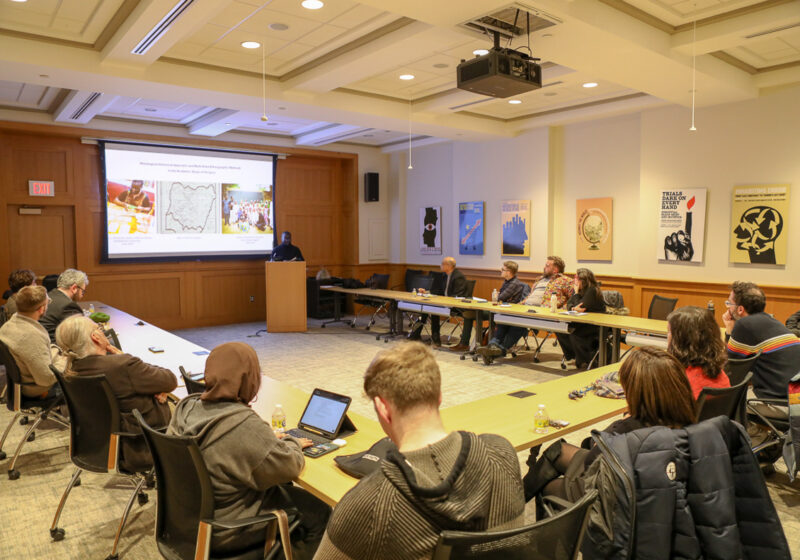The University’s Department of Religion and Classics hosted a guest lecture on Wednesday centered on tracing the history and colonial context of the pro-slavery ideology held by Boko Haram, an Islamist militant group founded in northeastern Nigeria that has been involved in violent insurgencies and kidnappings.
The talk, titled “Islam, Emancipation, and Proslavery Theology in a Post-Abolition World,” was given by Dr. Abdulbasit Kassim, a decorated interdisciplinary historian in the African diaspora. Kassim, currently a postdoctoral research fellow at NYU’s Center for the Study of Africa and the African Diaspora, was the co-editor of “The Boko Haram Reader: From Nigerian Preachers to the Islamic State,” which was about Boko Haram’s recent insurgencies in Nigeria.
The talk was undoubtedly heavy. Kassim discussed how Boko Haram’s recent insurgencies reflect their belief that the enslavement of non-Muslims is permissible. In April 2014, the group kidnapped nearly 300 young Christian girls from Chibok, a town in the northeastern Nigerian state of Borno. The tragedy spurred the #BringBackOurGirls movement, which garnered attention worldwide for the effort to bring the girls to safety.
The kidnappings were indicative of Boko Haram’s wider attempts to revive slavery. Through his talk, Kassim aimed to break down the group’s flawed beliefs, analyzing the points in history that built up to this moment, going all the way back to the Atlantic Slave Trade and European colonialism. His methodology consisted primarily of cross-analyzing samples of texts from different centers of learning and piecing them together. He also attempted to interview scholars, but he found that it was a touchy subject for most of them, so he relied more on textual evidence.
Kassim pointed to the continuities and changes in Islamic legal terms pertaining to slavery. These changes mainly concerned who should or should not be legally enslaved. In pre-colonial times, West African societies that observed Islam practiced slavery, but it was different from European slavery. Muslims were not supposed to be enslaved, and if the individual converted to Islam, they could not be held as a slave by another Muslim. Kassim referenced the words of the 15th-century West African Islamic scholar Ahmed Baba, “Whoever is enslaved in a State of unbelief may rightly be owned”. Slave-master relationships were also different in pre-colonial societies, as slaves were treated better, and religious texts advocated for the fair treatment of slaves. Yet there were still Muslim aristocrats who used Islam to justify slavery, even though their treatment of slaves sometimes deviated from the ideology of Islam.
European colonialism “ignored religious and jurisdictional discourses on slavery,” Kassim said. Europeans’ systematic approach to chattel slavery and the Atlantic Slave Trade disrupted social structures and nuanced local discourses on the religious and legal terms of slavery. 19th-century British colonialism of West Africa, Kassim continued, contributed to the persistence of pro-slavery thought that can be seen today in groups like Boko Haram, as the colonization itself was based on regulating the slave trade.
Attempts to revive slavery were seen through movements Kassim labeled the “old” and “new” jihad movements. The term jihad has been subject to misconstrual and contending interpretations. Though it generally means the struggle to connect more with God on a personal level, extremist groups have made this an outward, violent struggle that has produced bloodshed.
The “old” jihad movement, which took place during the 17th and 19th centuries, waged “jihad” movements and campaigns that engaged with religious classic texts and attempted to legitimize the institution of slavery. Little modifications of Ahmed Baba’s theological justification for slavery were made in order to justify enslaving enemies that were actually Muslims. One example was the case of William Harding of Borno, a state in northeast Nigeria, who was a Muslim but was kidnapped and enslaved by jihadists. At the time he was enslaved in 1808, trading was banned, so he was transported to Sierra Leone. His case showed the hypocrisy of Muslim authorities who captured and sold free Muslims for their own benefit.
The new jihad movements which are characterized by groups such as Boko Haram attempt to revive theoretical justification in enslaving non-Muslims again in a way Kassim describes as “nostalgia” for a “glory past” and “longing for the lost caliphate.” Leaders of this movement have gone to far ends in reviving this flawed theology — with one leader, Abubakar Shekau, claiming outrageously that the abolition of slavery would mark the end of the world.
Kassim ended on the note that, legally, slavery has been abolished, but the theology has not. While slavery is banned in most of the world and international efforts have been made to enact legal measures to recognize the rights of all people, fundamentalist groups still try to tie in theological dimensions when pushing to revive slavery. This is what the interdisciplinary historian calls the “afterlife of slavery.” In a post-abolition world, we see that the atrocities of the slave trade still reverberate in the religious and social landscapes of today’s global community.







